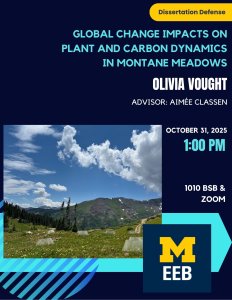Presented By: Ecology and Evolutionary Biology
EEB Student Dissertation Defense - Global change impacts on plant and carbon dynamics in montane meadows
Olivia Vought

Dissertation abstract: Plant biomass, a key carbon pool, is being affected by global changes, including shifts in plant community composition and changes in abiotic conditions. High-elevation, montane places, in particular, are being strongly impacted by warming temperatures, changing snowmelt, and species invasion. Though these global change processes are happening simultaneously, we know little about how they will interact to impact carbon cycling across different temporal scales. My dissertation addresses this research gap with three interrelated field experiments in montane meadows of Colorado and New Zealand. First, I worked in a long-term warming and dominant species removal experiment set at two elevations to measure how warming and dominant species removal impact subdominant plant biomass and the rate of biomass change across a growing season. Warming decreased subdominant plant biomass, and dominant species removal increased subdominant plant biomass at both elevations, consistently across the growing season. Biomass differences manifested in the first week of the growing season and persisted throughout the growing season, with no treatment effects on the growth rate of the plants, suggesting that early-season biomass conditions are important in determining overall plant biomass. Next, I investigated how warming interacted with an invasive dominant species to impact carbon cycling across the growing season in a montane grassland in New Zealand. Removal of the invasive dominant species reduced the productivity of the system, reducing the strength of the carbon sink. Though warming did not impact the productivity of the invaded plots, warming increased the productivity of the native plant community, suggesting that the native plant community could play an important role in maintaining productivity in future, warmer climate scenarios. Finally, I investigated how a shift in the early-season abiotic conditions, earlier snowmelt, might impact carbon cycling across the growing season in a montane meadow in Colorado. Earlier snowmelt increased the strength of the carbon sink, though unequally throughout the growing season. With earlier snowmelt, the growing season started earlier and increased carbon uptake through peak season. However, the late season had a weaker carbon sink, likely due to the earlier soil drying. Taken together, my dissertation reveals the many ways global change is likely to impact carbon cycling across temporal scales in highly sensitive montane environments.